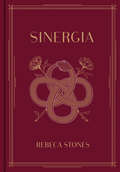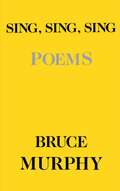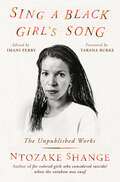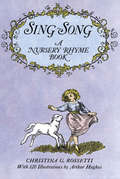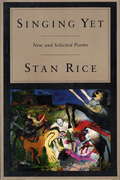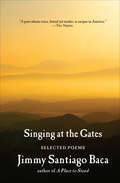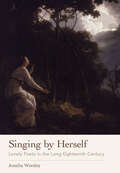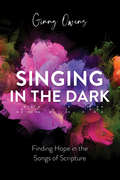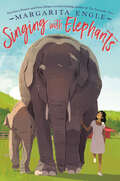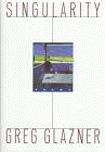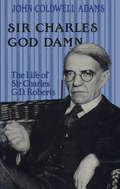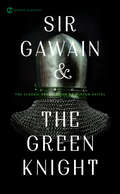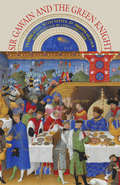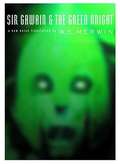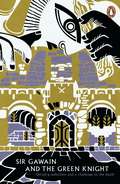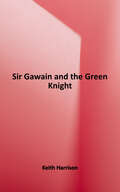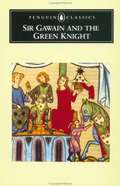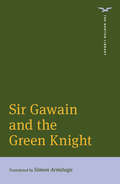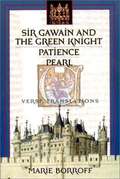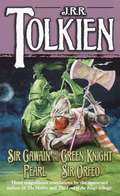- Table View
- List View
Sinergia
by Rebeca StonesEl libro más íntimo de Rebeca Stones. «Te animo a abrirte paso entre mis latidos.Te animo a descubrir el desamor, el dolor y la rabia, la recuperacióny la verdadera sinergia.Aquí, entre tus manos, poso parte de mi historia.» Rebeca ha pasado un año muy difícil, pero en vez de dejarse aplastar por el peso de sus pensamientos, los ha usado como inspiración para escribir una historia de desamor y amor contada tan solo con sentimientos.
Sing
by Tom Lichtenheld Joe RaposoThis book is based on Joe Raposo’s song, “Sing” from “Sesame Street”. It is the story of 3 baby birds who just begin to sing. Musical notes float into the air and the first two birds take off in flight as they utter song. The third bird sits silent and discouraged. It sits alone until a boy with a guitar sits beneath the bird in the nest. His musical notes from his songs float up and around this little bird until the bird can utter the notes that give it flight.
Sing Sing Sing: Poems
by Bruce MurphySing, Sing, Sing is unlike any recent first collection by an American poet. It goes against the grain of contemporary fashion by replacing prosaic narrative with a lyricism both symbolic and mysterious. This poet can appreciate experience as "the open/End of a bag fill/With ordinary things," yet also he has an ear for "a watch that goes on ticking/Underground," the shadow of history that lies across the present. Murphy manifests a sense of responsibility for protecting the spirit of lost people and lost things. But in their concern for posterity, his poems use language to forge a memory of the future. This ethical impulse, "the voice of the conscious heart," gives rise to a poetry which is, even when most admonitory, compassionate. Murphy explores our involvement in history as its doers, sufferers, and writers. Hence his poetry is at the intersection of the personal and that sense of our anonymity together in which "anyone can write my story," The title, Sing, Sing, Sing, hints at the imperative music that characterizes these poems.
Sing a Black Girl's Song: The Unpublished Work of Ntozake Shange
by Ntozake ShangeGMA&’s 15 Spectacular New Books to Read in September Ms. Magazine&’s September 2023 Reads for the Rest of UsThe Millions &“Most Anticipated&” Books of 2023LitHub&’s Most Anticipated Books of 2023Never-before-seen unpublished works by award-winning American literary icon Ntozake Shange, featuring essays, plays, and poems from the archives of the seminal Black feminist writer who stands alongside giants like Toni Morrison and Alice Walker, curated by National Book Award winner Imani Perry with a foreword by New York Times bestselling author Tarana Burke. In the late &’60s, Ntozake Shange was a student at Barnard College discovering her budding talent as a writer, publishing in her school&’s literary journal, and finding her unique voice. By the time she left us in 2018, Shange had scorched blazing trails across countless pages and stages, redefining genre and form as we know them, each verse, dance, and song a love letter to Black women and girls, and the community at large. Sing a Black Girl&’s Song is a new posthumous collection of Shange&’s unpublished poems, essays, and plays from throughout the life of the seminal Black feminist writer. In these pages we meet young Shange, learn the moments that inspired for colored girls who have considered suicide/when the rainbow is enuf…, travel with an eclectic family of musicians, sit on &“The Couch&” opposite Shange&’s therapist, and discover plays written after for colored girls&’ international success. Sing a Black Girl&’s Song houses, in their original form, the literary rebel&’s politically charged verses from the Black Arts Movement era alongside her signature tender rhythm and cadence that capture the minutia and nuance of Black life. Sing a Black Girl&’s Song is the continuation of a literary tradition that has bolstered generations of writers and a long-lasting gift from one of the fiercest and most highly celebrated artists of our time.
Sing a Song of Popcorn
by Eva Moore Beatrice Schenk de Regniers Jan Carr Mary Michaels WhiteA collection of 115 poems by a variety of well-known authors with illustrations by nine Caldecott medalists.
Sing with the Heart of a Bear: Fusions of Native and American Poetry, 1890-1999
by Kenneth LincolnExamining contemporary poetry by way of ethnicity and gender, Kenneth Lincoln tracks the Renaissance invention of the Wild Man and the recurrent Adamic myth of the lost Garden. He discusses the first anthology of American Indian verse, The Path on the Rainbow (1918), which opened Jorge Luis Borges' university surveys of American literature, to thirty-five contemporary Indian poets who speak to, with, and against American mainstream bards. From Whitman's free verse, through the Greenwich Village Renaissance (sandwiched between the world wars) and the post-apocalyptic Beat incantations, to transglobal questions of tribe and verse at the century's close, Lincoln shows where we mine the mother lode of New World voices, what distinguishes American verse, which tales our poets sing and what inflections we hear in the rhythms, pitches, and parsings of native lines.Lincoln presents the Lakota concept of "singing with the heart of a bear" as poetry which moves through an artist. He argues for a fusion of estranged cultures, tribal and émigré, margin and mainstream, in detailing the ethnopoetics of Native American translation and the growing modernist concern for a "native" sense of the "makings" of American verse. This fascinating work represents a major new effort in understanding American and Native American literature, spirituality, and culture.
Sing-Song: A Nursery Rhyme Book (Dover Children's Classics)
by Christina G. RossettiGood poetry for children is rare. Few collections, few single poems in fact, survive beyond a few years of popularity. There are exceptions — the poetry and verse of Walter de la Mare, Lewis Carroll, and Edward Lear come to mind. Still rarer is successful children's poetry by a poet known equally for other work, such as Christina Rossetti. <p><p> These verses — deceptively simple, light, often like a nursery rhyme in character — consider such topics as childhood activities, children's cruelty and gentleness, roses and wild flowers, nesting birds and farm animals, cold winter and blossoming spring. Many pose riddles and conundrums ("A hill has no leg, but has a foot;/A wine-glass a stem, but not a root"). <p> This is the only edition in print to reproduce the poems with the illustrations which originally accompanied them. Engravings by Arthur Hughes, one of the best-known illustrators of the Victorian era, catch the mood of each verse. <p> Sing-Song is a fitting name for this collection: many of the verses capture the cadence of the ballad. Children will enjoy their music. Parents will find the simple content and lyrical language of the verses ideal for reading aloud.
Singing School: Learning to Write (and Read) Poetry by Studying with the Masters
by Robert Pinsky"Magnificent . . . poems to inspire [with] brief and brilliant, offhand notes about how to read them."--Alan Cheuse, NPR Quick, joyful, and playfully astringent, with surprising comparisons and examples, this collection takes an unconventional approach to the art of poetry. Instead of rules, theories, or recipes, Singing School emphasizes ways to learn from great work: studying magnificent, monumentally enduring poems and how they are made-- in terms borrowed from the "singing school" of William Butler Yeats's "Sailing to Byzantium." Robert Pinsky's headnotes for each of the 80 poems and his brief introductions to each section take a writer's view of specific works: William Carlos Williams's "Fine Work with Pitch and Copper" for intense verbal music; Emily Dickinson's "Because I Could Not Stop for Death" for wild imagination in matter-of-fact language; Robert Southwell's "The Burning Babe" for surrealist aplomb; Wallace Stevens's "The House Was Quiet and the World Was Calm" for subtlety in meter. Included are poems by Aphra Behn, Allen Ginsberg, George Herbert, John Keats, Mina Loy, Thomas Nashe, and many other master poets. This anthology respects poetry's mysteries in two senses of the word: techniques of craft and strokes of the inexplicable.
Singing Yet
by Stan Rice"There are so many profound and finely constructed poems in Singing Yet (like the Whitmanesque 'America the Beautiful' in which the poet pledges allegiance 'this time to the vivification of our lost Body Politic,/ nerves and follicles and arteries/ ablaze in the suaveness of night') that it is impossible to cover even a fourth of this collection... As a volume of selected poems... it stands a monument to the trust of the poet's own life and writings." Dave Oliphant, Texas Observer "The new and selected poems in Stan Rice's Singing Yet forcefully resist categorization. They are not shaped or mannered to fit in anybody's idea of a school of poetry, and yet they are equally uninterested in being ingratiating to the reader who is ignorant of contemporary poetry... the new work contains Rice's most completely realized poems, small masterpieces like 'I Called the Cow' and 'The Madness of Chance,' chancey but absorbing autobiographical rambles like 'Time in Tool,' and a dozen black comic riffs." Ralph Adamo, New Orleans Times-Picayune "Although Rice's first book in nine years includes work from three earlier volumes, it also stands as a whole... he affirms the physicality of language and flesh, the 'doctrine of perception as animal things defined.' And through affirmation, he acquires compassion and tenderness. This is serious stuff, urgent and original." Publisher's Weekly
Singing at the Gates: Selected Poems (Books That Changed the World)
by Jimmy Santiago Baca“This fiery retrospective collection” of poetry by the acclaimed Chicano-American author of A Place to Stand is “warm and furious…righteous and prayerful” (Booklist).Award-winning writer Jimmy Santiago Baca is lauded for his talent in weaving personal and political threads to create a pertinent and poignant narrative. He addresses universal issues with passion, grace, and vivid sensory detail.Singing at the Gates is a collection of Baca’s work stretching across four decades—poems that revitalize the national dialogue: raging against war and imprisonment, celebrating family and the bonds of friendship, heightening appreciation for and consciousness of the environment. A career-spanning selection, it includes poems drawn from Baca’s first chapbook, letters he wrote from prison to a woman named Mariposa, and recent meditations on the significance of breaking through oppression. “A poet whose voice, brutal and tender, is unique in America.”—The Nation
Singing by Herself: Lonely Poets in the Long Eighteenth Century
by Amelia WorsleySinging by Herself reinterprets the rise of literary loneliness by foregrounding the female and feminized figures who have been overlooked in previous histories of solitude. Many of the earliest records of the terms "lonely" and "loneliness" in British literature describe solitaries whose songs positioned them within the tradition of female complaint. Amelia Worsley shows how these feminized solitaries, for whom loneliness was both a space of danger and a space of productive retreat, helped to make loneliness attractive to future lonely poets, despite the sense of suspicion it evoked. Although loneliness today is often associated with states of atomized interiority, soliloquy, and self-enclosure, this study of eighteenth-century poetry disrupts the presumed association between isolation, singular speech, and bounded models of poetic subjectivity. In five chapters focused on lonely poet figures in the works of John Milton, Anne Finch, Alexander Pope, Thomas Gray, and Charlotte Smith—which also take account of the wider eighteenth-century fascination with literary loneliness—Singing by Herself shows how poets increasingly associated the new literary mode of being alone with states of disembodiment, dispersal, and echoic self-doubling. Seemingly solitary lonely voices often dissolve into polyvocal, allusive community, Worsley argues, when in dialogue with each other and also with classical figures of feminized lament such as Sappho, Echo, and Philomela.The book's provocative reflections on lyric mean that it will have a broad appeal to scholars interested in the history of poetry and poetics, as well as to those who study the literary history of gender, affect, and emotion.
Singing in the Dark: Finding Hope in the Songs of Scripture
by Ginny OwensFar too often, life&’s challenges and questions cause people to fight feelings of doubt and despair, as they search endlessly for hope. In Singing in the Dark, Ginny Owens introduces the reader to powerful ways of drawing closer to God and how the elements of music, prayer, and lament offer rich, vibrant, and joyful communion with Him, especially on the darkest days. Ginny has gained a unique life perspective, as she has lived without sight since age three. She brings rich, biblical teaching that will encourage readers and compel them to dig deep into the beautiful songs, prayers, and poetry of Scripture—the same words through which the people of the Bible flourished in impossible circumstances. Singing in the Dark includes reflection and journaling prompts at the end of each chapter.
Singing with Elephants
by Margarita EngleA powerful novel in verse from Newbery and Pura Belpré Award-winning author Margarita Engle about the friendship between a young girl and the poet Gabriela Mistral that leads to healing and hope for both of them.Cuban-born eleven-year-old Oriol lives in Santa Barbara, California, where she struggles to belong. But most of the time that's okay, because she enjoys helping her parents care for the many injured animals at their veterinary clinic. Then Gabriela Mistral, the first Latin American winner of a Nobel Prize in Literature, moves to town, and aspiring writer Oriol finds herself opening up. As she begins to create a world of words for herself, Oriol learns it will take courage to stay true to herself and do what she thinks is right--attempting to rescue a baby elephant in need--even if it means keeping secrets from those she loves. A beautifully written, lyrically told story about the power of friendship-- between generations, between humans and animals--and the potential of poetry to inspire action and acceptance. * "Replete with lovely, nearly magical imagery...Brilliant, joyful, and deeply moving." -Kirkus, starred review * "Employing immersive free verse that conveys themes of compassion, friendship, justice, and vulnerability, Engle captures how inexplicable Oriol&’s grief feels, encasing it in a powerful, charitable, and brave young voice." -Publishers Weekly, starred review * "A novel written in verse that sings in your heart." -Pura Belpré Award-winning author Marjorie Agosín
Singularity
by Greg GlaznerElegant poems on a variety of subjects, mostly the search for meaning in an increasingly more complex world, full of scientific marvels, but still capable of heartbreaking personal tragedies.
Sinners Welcome
by Mary KarrMary Karr describes herself as a black-belt sinner, and this -- her fourth collection of poems --traces her improbable journey from the inferno of a tormented childhood into a resolutely irreverent Catholicism. Not since Saint Augustine wrote "Give me chastity, Lord -- but not yet!" has anyone brought such smart-assed hilarity to a conversion story. Karr's battle is grounded in common loss (a bitter romance, friends' deaths, a teenage son's leaving home) as well as in elegies for a complicated mother. The poems disarm with the arresting humor familiar to readers of her memoirs, The Liars' Club and Cherry. An illuminating cycle of spiritual poems have roots in Karr's eight-month tutelage in Jesuit prayer practice, and as an afterword, her celebrated essay on faith weaves the tale of how the language of poetry, which relieved her suffering so young, eventually became the language of prayer. Those of us who fret that poetry denies consolation will find clear-eyed joy in this collection.
Sir Charles God Damn: The Life of Sir Charles G.D.Roberts
by John Coldwell AdamsA new era in Canadian poetry began in 1880 with the publication of Charles G.D. Roberts' Orion and Other Poems. He was just twenty years old. Roberts was soon acknowledged as leader of the so-called Confederation Poets--Bliss Carman, Duncan Campbell Scott, and Archibald Lampman. During his long lifetime he wrote hundreds of poems as well as novels, histories, short stories, translations, and essays; he also originated the realistic animal story popularized by Ernest Thompson Seton. He awed literary critics with the versatility of his writing and shocked staid Canadians with the escapades of an unconventional private life. Married at twenty in his native New Brunswick, Roberts soon after began a series of romantic entanglements. While his wife, May, raised the children in Fredericton, he swanned around New York, Havana, and the capitals of Europe. He experienced the Bohemian life of Washington Square around the turn of the century and lived in Montparnasse long before it became famous as an expatriate haven. In 1907 he sailed off to Europe and stayed for eighteen years. When he finally returned aboard the Berengaria in 1925 for a reading tour, he was lionized from coast to coast. For almost two decades he remained a prominent figure in Canadian literary and social circles. He was national president of the Canadian Authors' Association from 1927 to 1929, and in 1935 he was knighted. At the age of eighty-three, just three weeks before his death in 1943, he married for a second time. Perhaps over-praised as a writer in his own lifetime, Roberts' reputation has since languished. His main literary achievement, Adams concludes, was in being the first Canadian writer to come to terms with the Canadian landscape, influencing his contemporaries to see their own surroundings with fresh and discerning eyes. The story of his personal life, recounted here fully and objectively for the first time, adds a vivid portrait to the gallery of Canada's literary pioneers.
Sir Gawain and the Green Knight
by Burton Raffel Neil D. IsaacsTHE INSPIRATION FOR THE UPCOMING MAJOR MOTION PICTURE THE GREEN KNIGHT—STARRING DEV PATELAn epic poem of honor and bravery written by an anonymous fourteenth-century poet, Sir Gawain and the Green Knight is recognized as an equal of Chaucer&’s masterworks and of the great Old English poems, including Beowulf. It is Christmas in Camelot, and a truly royal feast has been laid out for King Arthur and his knights. And though there is plenty of good cheer to go around, the festivities hardly begin before a monstrous, axe-wielding, green-skinned knight barges in. He has come to see the famous Knights of the Round Table and offer them a simple but deadly challenge—a challenge taken on by the brave Sir Gawain—a challenge that will force him to choose between his honor and his life....Includes a Preface by Burton Raffelan Introduction by Brenda Websterand an Afterword by Neil D. Isaacs
Sir Gawain and the Green Knight
by Christine Chism Joseph GlaserA dazzling recreation of the most memorable Middle English poem, and one that captures the original alliterative verse in all its dimensions: sense, sound, and rhythm. --Ad Putter, Professor of Medieval English Literature, University of Bristol
Sir Gawain and the Green Knight
by W. S. MerwinA splendid new translation of the classic Arthurian tale of enchantment, adventure, and romance, presented alongside the original Middle English text. It is the height of Christmas and New Year's revelry when an enormous knight with brilliant green clothes and skin descends upon King Arthur's court. He presents a sinister challenge: he will endure a blow of the axe to his neck without offering any resistance, but whoever gives the blow must promise to take the same in exactly a year and a day's time. The young Sir Gawain quickly rises to the challenge, and the poem tells of the adventures he finds--an almost irresistible seduction, shockingly brutal hunts, and terrifyingly powerful villains--as he endeavors to fulfill his promise. Capturing the pace, impact, and richly alliterative language of the original text, W. S. Merwin has imparted a new immediacy to a spellbinding narrative, written centuries ago by a poet whose name is now unknown, lost to time. Of the Green Knight, Merwin notes in his foreword: "We seem to recognize him--his splendor, the awe that surrounds him, his menace and his grace--without being able to place him ... We will never know who the Green Knight is except in our own response to him."
Sir Gawain and the Green Knight (Legends from the Ancient North)
by Petra Borner'Tomorrow I must set off to receive that blow, to seek out that creature in green, God help me!'J.R.R. Tolkien spent much of his life studying, translating and teaching the great epic stories of northern Europe, filled with heroes, dragons, trolls, dwarves and magic. He was hugely influential for his advocacy of Beowulf as a great work of literature and, even if he had never written The Hobbit and The Lord of the Rings, would be recognised today as a significant figure in the rediscovery of these extraordinary tales.Legends from the Ancient North brings together from Penguin Classics five of the key works behind Tolkien's fiction.They are startling, brutal, strange pieces of writing, with an elemental power brilliantly preserved in these translations.They plunge the reader into a world of treachery, quests, chivalry, trials of strength.They are the most ancient narratives that exist from northern Europe and bring us as near as we will ever get to the origins of the magical landscape of Middle-earth (Midgard) which Tolkien remade in the 20th century.
Sir Gawain and the Green Knight (Oxford World's Classics)
by Keith HarrisonThis text with its intricate plot of enchantment and betrayal is probably the most skilfully told story in the whole of the English Arthurian cycle. Originating from the northwest midlands of England, it is based on two separate and very ancient Celtic motifs of the Beheading and the Exchange of Winnings, brought together by the anonymous 14th-century poet. His telling comprehends a great variety of moods and modes - from the stark realism of the hunt scenes to the delicious and dangerous bedroom encounters between Lady Bercilak and Gawain, from moments of pure lyric beauty when he evokes the English countryside in all its seasons, to authorial asides that are full of irony and puckish humour. This new verse translation uses a modern alliterative pattern that subtly echoes the music of the original at the same time as it strives for fidelity.
Sir Gawain and the Green Knight (Penguin Classics)
by Brian StoneA New Year's feast at King Arthur's court is interrupted by the appearance of a gigantic Green Knight, resplendent on horseback. He challenges any one of Arthur's men to behead him, provided that if he survives he can return the blow a year later. Sir Gawain accepts the wager and decapitates the knight - but the mysterious warrior cheats death and vanishes, bearing his head with him. The following winter Gawain sets out to find the knight in the wild Northern lands and to keep his side of the bargain. One of the great masterpieces of Middle English poetry, Sir Gawain and the Green Knightmagically combines elements of fairy tales and heroic sagas with the pageantry, chivalry and courtly love of medieval Romance. Brian Stone's evocative translation is accompanied by an introduction that examines the Romance genre, and the poem's epic and pagan sources. This edition also includes essays discussing the central characters and themes, theories about authorship and Arthurian legends, and suggestions for further reading and notes
Sir Gawain and the Green Knight (The Norton Library #0)
by Simon ArmitageAbout Simon Armitage’s translation Simon Armitage’s “compulsively readable, energetic, free-flowing, high-spirited version” (Edward Hirsch, The New York Times) of Sir Gawain and the Green Knight offers “a brilliantly well-tuned modern score for one of the finest surviving examples of Middle English poetry” (Poetry Review) that “recreates the original’s gnarled, hypnotic muscle, its tableaux and landscapes, and its weird, unsettling drama” (Mark Ford, the Financial Times). This edition, revised by Armitage with advice from scholars Alfred David and James Simpson, also offers a new introduction by the translator.
Sir Gawain and the Green Knight, Patience, and Pearl: Verse Translations
by Marie BorroffVerse translations of Sir Gawain and the Green Knight, Patience, and Pearl by Marie Borroff. "These translations by Marie Borroff not only are one of the great achievements of the translator's craft but are works of art in their own right."
Sir Gawain and the Green Knight, Pearl, Sir Orfeo
by J. R. R. TolkienSIR GAWAIN AND THE GREEN KNIGHT, PEARL, and SIR ORFEO are masterpieces of a remote and exotic age--the age of chivalry and wizards, knights and holy quests. Yet it is only in the unique artistry and imagination of J. R. R. Tolken that the language, romance, and power of these great stories comes to life for modern readers, in this masterful and compelling new translation.
